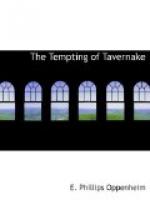She nodded, a little contemptuously.
“I suppose you do your best,” she declared. “Tell me, now, what is this fresh thing which has disturbed you?”
Her visitor stared at her.
“Does there need to be any fresh thing?” he muttered.
“I suppose it is something about Wenham?” she asked.
The man shivered. He opened his lips and closed them again. The woman’s tone, if possible, grew colder.
“I hope you are not going to tell me that you have disobeyed my orders,” she said.
“No,” he protested, “no! I was there yesterday. I came back by the mail from Penzance. I had to motor thirty miles to catch it.”
“Something has happened, of course,” she went on, “something which you are afraid to tell ’me. Sit up like a man, my dear father, and let me have the truth.”
“Nothing fresh has happened at all,” he assured her. “It is simply that the memory of the day I spent at that place and that the sight of him has got on my nerves till I can’t sleep or think of anything else.”
“What rubbish!” she exclaimed.
“You have only seen the place in fine weather,” he continued, dropping his voice a little. “Elizabeth, you have no idea what it is really like. Yesterday morning I got out of the train at Bodmin and I motored through to the village of Clawes. After that there were five miles to walk. There’s no road, only a sort of broken track, and for the whole of that five miles there isn’t even a farm building to be seen and I didn’t meet a human soul. There was a sort of pall of white-gray mists everywhere over the moor, sometimes so dense that I couldn’t see my way, and you could stop and listen and there wasn’t a thing to be heard, not even a sheep bell.”
She laughed softly. .
“My dear, foolish father,” she murmured, “you don’t understand what a rest cure is. This is quite all right, quite as it should be. Poor Wenham has been seeing too many people all his life — that is why we have to keep him quiet for a time. You can skip the scenery. I suppose you got to the house at last?”
“Yes, I got there,” continued her father. “You know what a bleak-looking place it is, right on the side of a bare hill—a square, gray stone place just the color of the hillside. Well, I got there and walked in. There was Ted Mathers, half dressed, no collar, with a bottle of whiskey on the table, playing some wretched game of cards by himself. Elizabeth, what a brute that man is!”
She shook her head.
“Go on,” she said. “What about Wenham?”
“He was there in a corner, gazing out of the window. When I came he sprang up, but when he saw who it was, he—he tried to hide. He was afraid of me.”
“Why?” she asked.
“He said that I—I reminded him of you.”
“Absurd!” she murmured. “Tell me, how did he look?”
“Ill, wretched, paler and thinner than ever, and wilder looking.”




